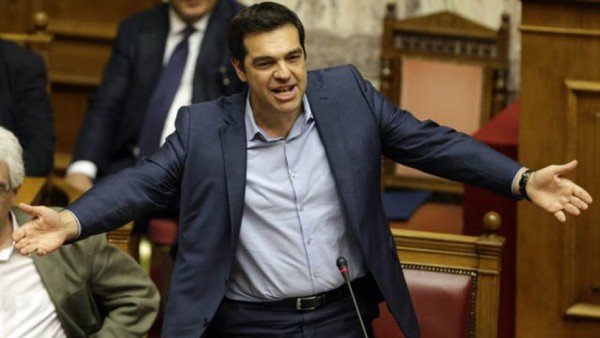Greece Parliament Passes Second Set of Bailout Reforms
Greece’s parliament has passed a second set of reforms, meaning that negotiations on an €86 billion European Union bailout can begin.
The reforms include changes to Greek banking and an overhaul of the judiciary system.
Thousands of protesters demonstrated outside of parliament as the bill was debated, with protests briefly turning violent as petrol bombs were thrown at police.
There had been fears of a rebellion by lawmakers but PM Alexis Tsipras was easily able to muster the support required. In total, the measures received 230 votes in favor and 63 against with five abstentions.
The debate ended at 04:00 local time.
Among those who voted against were 31 members of his own Syriza party. However, this represents a smaller rebellion than in last week’s initial vote.
Former Greek Finance Minister Yanis Varoufakis was one of those rebels in the first vote who returned to vote with the government this time.
Yanis Varoufakis wrote that he felt it was important to preserve the unity of the government, even if he believed the program was “designed to fail” by Greece’s creditors.
Speaking before the vote, Alexis Tsipras stressed that he was not happy with the measures that creditors had imposed.
“We chose a difficult compromise to avert the most extreme plans by the most extreme circles in Europe,” he told parliament.
Representatives of the European institutions that would provide the bailout funds will begin negotiations in Athens on July 24.
Last week, Greece passed an initial set of austerity measures imposed by its creditors. These were a mix of economic reforms and budget cuts demanded by the eurozone countries and institutions before bailout talks could continue.
This second set of measures passed early on Thursday morning were of a more structural nature, including:
- a code of civil protection aimed at speeding up court cases
- the adoption of an EU directive to bolster banks and protect savers’ deposits of less than €100,000
- the introduction of rules that would see bank shareholders and creditors – not taxpayers – cover costs of a failed bank
More contentious measures – phasing out early retirement and tax rises for farmers – have been pushed back to August.
On July 22, the European Central Bank (ECB) increased its cash lifeline to Greek banks.
The emergency injection of an extra €900 million, the ECB’s second in a week, came just hours before the vote.
The International Monetary Fund (IMF) confirmed on July 20 that Greece had cleared its overdue debt repayments of €2.05 billion and was no longer in arrears.
The repayments, which included €4.2 billion to the ECB, were made possible by a short-term EU loan of €7.16 billion.
Greece’s next major deadline is August 20, when it must pay €3.2 billion owed to the ECB, followed by a payment of €1.5 billion to the IMF in September.
The protest in Athens’ Syntagma Square – called by Greece’s public sector union – was reported to have been largely peaceful, until a number of petrol bombs were thrown in the direction of police.
